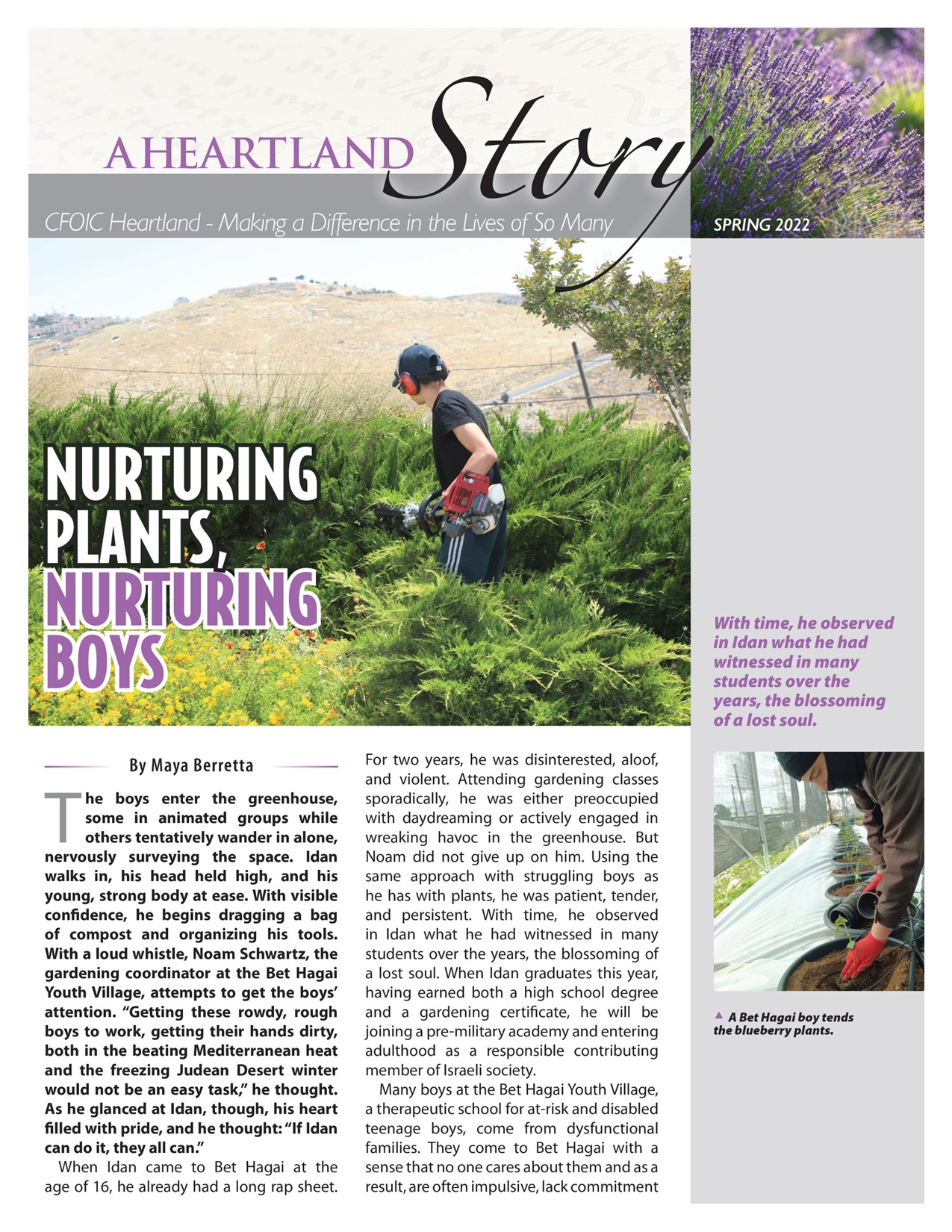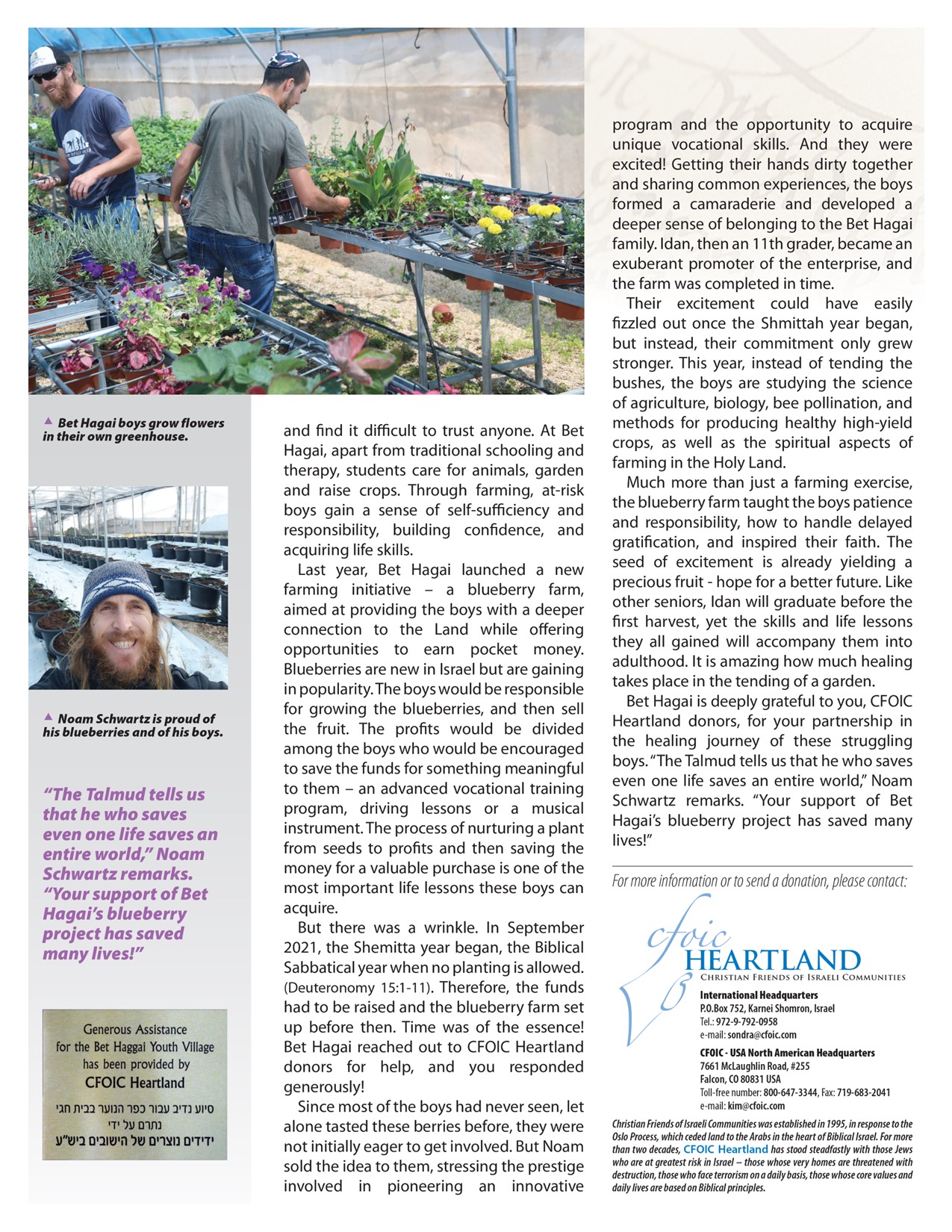

The boys enter the greenhouse, some in animated groups while others tentatively wander in alone, nervously surveying the space. Idan walks in, his head held high, and his young, strong body at ease. With visible confidence, he begins dragging a bag of compost and organizing his tools. With a loud whistle, Noam Schwartz, the gardening coordinator at the Bet Hagai Youth Village, attempts to get the boys’ attention. “Getting these rowdy, rough boys to work, getting their hands dirty, both in the beating Mediterranean heat and the freezing Judean Desert winter would not be an easy task,” he thought. As he glanced at Idan, though, his heart filled with pride, and he thought: “If Idan can do it, they all can.”
When Idan came to Bet Hagai at the age of 16, he already had a long rap sheet. For two years, he was disinterested, aloof, and violent. Attending gardening classes sporadically, he was either preoccupied with daydreaming or actively engaged in wreaking havoc in the greenhouse. But Noam did not give up on him. Using the same approach with struggling boys as he has with plants, he was patient, tender, and persistent. With time, he observed in Idan what he had witnessed in many students over the years, the blossoming of a lost soul. When Idan graduates this year, having earned both a high school degree and a gardening certificate, he will be joining a pre-military academy and entering adulthood as a responsible contributing member of Israeli society.
Many boys at the Bet Hagai Youth Village, a therapeutic school for at-risk and disabled teenage boys, come from dysfunctional families. They come to Bet Hagai with a sense that no one cares about them and as a result, are often impulsive, lack commitment and find it difficult to trust anyone. At Bet Hagai, apart from traditional schooling and therapy, students care for animals, garden and raise crops. Through farming, at-risk boys gain a sense of self-sufficiency and responsibility, building confidence, and acquiring life skills.
Last year, Bet Hagai launched a new farming initiative – a blueberry farm, aimed at providing the boys with a deeper connection to the Land while offering opportunities to earn pocket money. Blueberries are new in Israel but are gaining in popularity. The boys would be responsible for growing the blueberries, and then sell the fruit. The profits would be divided among the boys who would be encouraged to save the funds for something meaningful to them – an advanced vocational training program, driving lessons or a musical instrument. The process of nurturing a plant from seeds to profits and then saving the
money for a valuable purchase is one of the most important life lessons these boys can acquire.
But there was a wrinkle. In September 2021, the Shemitta year began, the Biblical Sabbatical year when no planting is allowed. (Deuteronomy 15:1-11). Therefore, the funds had to be raised and the blueberry farm set up before then. Time was of the essence! Bet Hagai reached out to CFOIC Heartland donors for help, and you responded generously!
Since most of the boys had never seen, let alone tasted these berries before, they were not initially eager to get involved. But Noam sold the idea to them, stressing the prestige involved in pioneering an innovative program and the opportunity to acquire unique vocational skills. And they were excited! Getting their hands dirty together and sharing common experiences, the boys formed a camaraderie and developed a deeper sense of belonging to the Bet Hagai family. Idan, then an 11th grader, became an exuberant promoter of the enterprise, and the farm was completed in time. Their excitement could have easily fizzled out once the Shmittah year began, but instead, their commitment only grew stronger. This year, instead of tending the bushes, the boys are studying the science of agriculture, biology, bee pollination, and methods for producing healthy high-yield crops, as well as the spiritual aspects of farming in the Holy Land.
Much more than just a farming exercise, the blueberry farm taught the boys patience and responsibility, how to handle delayed gratification, and inspired their faith. The seed of excitement is already yielding a precious fruit – hope for a better future. Like other seniors, Idan will graduate before the first harvest, yet the skills and life lessons they all gained will accompany them into adulthood. It is amazing how much healing takes place in the tending of a garden. Bet Hagai is deeply grateful to you, CFOIC Heartland donors, for your partnership in the healing journey of these struggling boys. “The Talmud tells us that he who saves even one life saves an entire world,” Noam Schwartz remarks. “Your support of Bet Hagai’s blueberry project has saved many lives!”
